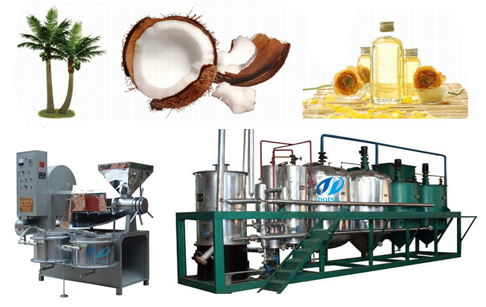Project Report For Coconut Oil Mill
Introduction
Project report for Coconut Oil Mill is as follows.
Coconut oil is an edible oil extracted from matured coconuts collected from the coconut palm (Cocos nucifera). For millennia, it has been the principal source of fat in the diets of millions of people throughout the tropical world. It has a wide range of applications in food, medicine, and industry.
There are two types of coconut oil milling techniques or technologies: dry procedures and wet processes. The method of producing coconut oil that begins with copra as the raw material is known as the dry process, whereas the approach that begins with fresh coconuts is known as the wet process. The grinding of coconut oil The dry processing of meat for the coconut oil milling process include converting coconut meat into copra before expelling and refining.
Processing Of Coconut
Oil Mill
Harvesting and Husking : The gathering of mature coconuts is the first stage in the coconut oil milling process. After harvesting, the coconuts are dehusked to remove the fibrous outer coating. This can be done manually using tools such as machetes or mechanically with dehusking equipment.
Drying : Coconuts are dried after they have been husked to minimise their moisture content. Drying can be accomplished in a variety of ways, including solar drying, kiln drying, and mechanical drying. The coconuts are sun dried by exposing them to direct sunlight until the moisture content is decreased to roughly 6-8%. Kiln drying uses regulated heat to accelerate drying, whereas mechanical dryers employ hot air circulation.
Crushing : After drying, the coconuts are crushed to remove the coconut meat or copra. This can be accomplished either manually or mechanically. Manual crushing involves grating or chopping dried coconuts into smaller pieces with sharp instruments. Mechanical crushing is the process of breaking down copra into small pieces using crushers or grinders.
Pressing : The copra is ready for oil extraction once it has been crushed. Mechanical pressing is the most popular method for extracting coconut oil. The crushed copra is placed in a hydraulic press or expeller machine, which applies pressure to extract the oil. The extracted oil is separated from the residue, which is known as coconut cake or meal.
Filtering : The extracted coconut oil may contain impurities, such as solids and sediments. To obtain clear and pure oil, it undergoes a filtering process. The oil is passed through filter presses or filter cloth to remove any remaining particles, resulting in a clean and transparent oil.
Refining : Coconut oil may be refined to improve its purity, flavour, and scent, depending on the desired quality and application. Degumming, neutralization, bleaching, and deodorization are all processes used in refining. These techniques aid in the removal of contaminants, free fatty acids, and undesirable odours, yielding refined coconut oil suitable for cooking or cosmetic use.
Packaging and Storage : Once the coconut oil is refined and filtered, it is ready for packaging. The oil is typically stored in clean, airtight containers to maintain its quality and prevent oxidation. Proper labeling is done, including information about the product, manufacturing date, and expiry date. Coconut oil should be stored in a cool and dry place away from direct sunlight to prolong its shelf life.

Market Potential Of Coconut
Oil Mill
The global market for virgin coconut oil was valued at USD 2.11 billion in 2020. The market is predicted to grow at a CAGR of 7.35% between 2021 and 2028, rising from USD 2.24 billion in 2021 to USD 3.69 billion in 2028.
The raw material supply is one of the most important aspects of the coconut oil value chain, where key companies and suppliers are experiencing difficulties due to inadequate logistics and restrictions on public travel in affected nations throughout the world, which can lead to supply interruptions.
Over the last decade, the coconut oil business has risen moderately as people’s need for coconut oil has grown due to its multiple health benefits. Its use in personal care and cosmetics, such as hair care and skincare, has paved the road for the coconut oil market to grow. The coconut oil market has expanded due to its easy availability and low pricing, especially among clients in tropical nations.
A number of issues could hinder demand for virgin oil derived from coconuts. The most important of these is the price of coconut oil on the worldwide market. The cost of VCO is usually extremely high. As a result, consumers cannot afford to use this oil on a daily basis, and they may return to utilising other, less expensive oils. As a result, it is possible that these elements will slow the market’s expansion.
Project Report Sample On Coconut Oil Mill
Need Help?
Create 100% Bankable Project Report
